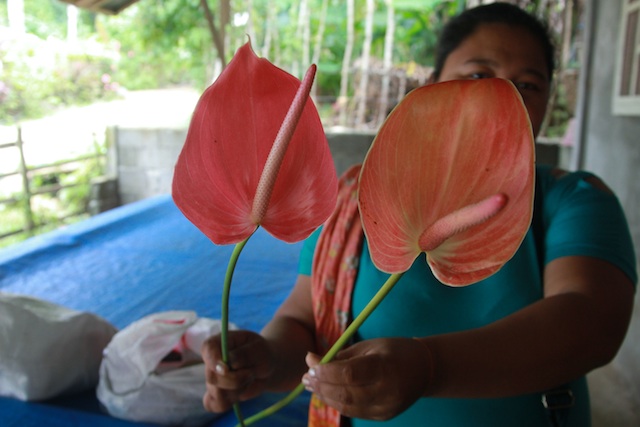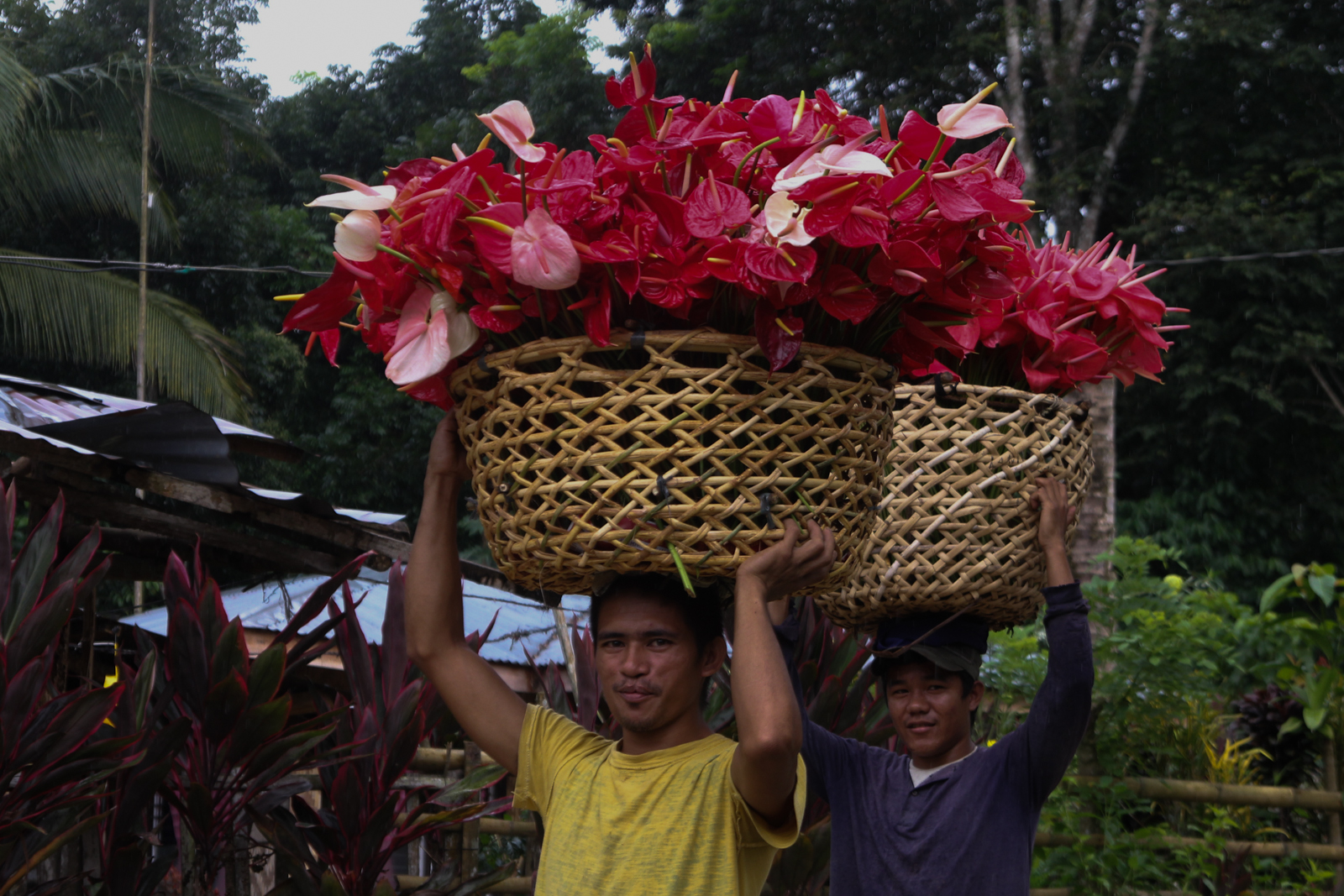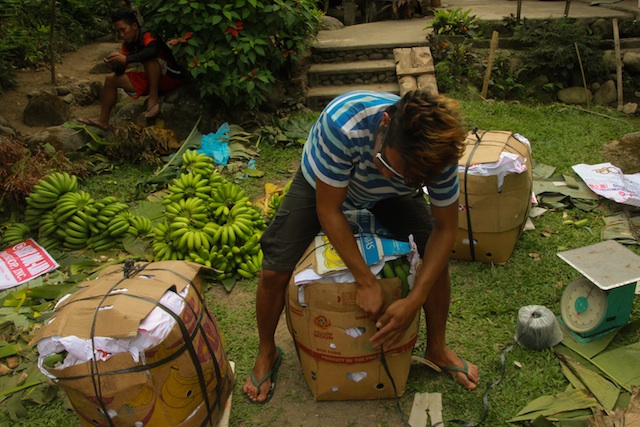BATASAN, Makilala, North Cotabato (Mindanews /20 February ) – Where have all the flowers of this village gone?
The drought has not spared the anthuriums planted under coconut, coffee or cacao trees, under the shade of bananas and other fruit trees like lanzones and durian.
Unlike in October, there were no residents coming down the mountain road on a tractor, on horseback or on foot with anthuriums on this Tuesday morning, no thick bunch of the newly-harvested flowers in their hands or on top of their heads, no bukag (large basket) of those red, white and pink cutflowers on their heads or shoulders.
The buying station that used to be a beehive of activities in this village on the foothills of Mt. Apo is quiet, the table where anthuriums are sorted according to sizes and colors, empty.
“Sa una bukag, karon balde na lang” (Before the harvest would be placed in large baskets, now it’s just a pail), says Marilyn Catamoro, a 30-year old Bagobo Tagabawa who is one of three local buyers here.
 Marilyn Catamora shows the effects of drought to the anthuriums at her buying station in Barangay Batasan, Makilala, North Cotabato on February 16, 2016. The color of the flower on the right is fading. Anthurium growers suffer a big decline in incomes due to drought. MindaNews photo by TOTO LOZANO
Marilyn Catamora shows the effects of drought to the anthuriums at her buying station in Barangay Batasan, Makilala, North Cotabato on February 16, 2016. The color of the flower on the right is fading. Anthurium growers suffer a big decline in incomes due to drought. MindaNews photo by TOTO LOZANO
She talks about how the pink anthuriums fade into white in a few days, picks two stems from a small bunch to show the comparison, and worries that her supply to a flower shop in Butuan City has dropped from a thousand stems a week to less than 500.
The plant is a perennial and harvest is all year-round. As farmer Rico Lim, who had been growing anthuriums since 2008, said in October, the best part about growing anthuriums, is that the capital required is small (the planting material costs only P10 pesos, the imported variety is a bit higher but under 20 pesos), you can plant them in your backyards, and “it is forever.”
A good weather, however, is not forever.
 BASKETS IN BLOOM. Farmers deliver a basket full of anthuriums to a buying station in Purok 3, Barangay Batasan, Makilala, North Cotabato in this file photo taken on October 28, 2015 by TOTO LOZANO
BASKETS IN BLOOM. Farmers deliver a basket full of anthuriums to a buying station in Purok 3, Barangay Batasan, Makilala, North Cotabato in this file photo taken on October 28, 2015 by TOTO LOZANO
When MindaNews first visited this village on October 28, Datu Bienvenido “Boy” Macalos, also a Bagobo Tagabawa, said anthuriums were a big help in the livelihood of the Lumads (Indigenous Peoples) and settlers here and in other barangays in Makilala — New Israel, Old Bulatukan, New Bulatukan, Kisante, Biangan, Malasila and Buena Vida.
He explained that while bananas were still a main source of income for many, there’s more food on the table now because anthuriums provide them a regular source of additional income.
Last Tuesday, Mercy Gerarman, who used to earn an average of PhP 2,000 a week from selling anthuriums, said she now earns only about half, or less, of that due to the drought.
In October, Nelly de Vera, a 38-year old Tagabawa with seven children, said she had been earning at least 300 pesos a week for at least two years by planting and selling anthuriums.
Before getting into anthuriums, Nelly’s earnings from selling bananas could hardly put food on the table – food other than bananas, that is.
But the bananas have not been spared by the drought, too, making the prospects even bleaker for residents relying on bananas and anthuriums.
At the buying station for anthuriums, one could see a pile of Amas Senorita bananas which used to sell for 8 pesos per kilo in boxes of 12 kilos each but since the exporters have stopped buying, they sell to retailers at 5 pesos per kilo.
Rubber is no alternative either because from its peak of about 90 pesos per kilo in 2010 or 2011, tapped rubber now costs only 14 per kilo, forcing quite a number to just chop off the rubber trees and sell as round logs to bandsaw mills. Rubber lumber is made into crates.
Even that other source of income – making brooms from Tahiti tiger grass – is affected because the grass’ growth is stunted, they said.
“Krisis kaayo” (We’re in dire crisis), Catamora and Gerarman said, as they narrated how quite a number of residents have opted to find work as domestic helpers in Kidapawan City or Davao City to feed their families, and the younger ones seek employment in the cities’ malls.
The motorcyles that residents bought on installment basis, thanks to earnings from anthuriums, are in danger of being repossessed by the companies selling them.
Tomas Gerarman, Mercy’s brother in law, says the drought has also affected the marang (milk fruit). There are no fruits to harvest now, he said.
He has stopped tapping rubber since eight months because the price is so low.
In the past, he earned P2,000 every 15 days from tapping rubber. “Karon, zero” (now, zero).
Before the drought, he earned P300 a week on the average, from selling anthuriums.
 At the buying station in Purok 2, Barangay Batasan, Makilala, a farm worker packs boxes of bananas to be delivered to a buyer in Davao City. Banana growers complain of decline in their harvest due to the drought. MindaNews photo by TOTO LOZANO
At the buying station in Purok 2, Barangay Batasan, Makilala, a farm worker packs boxes of bananas to be delivered to a buyer in Davao City. Banana growers complain of decline in their harvest due to the drought. MindaNews photo by TOTO LOZANO
At the buying station for bananas in Purok 2, Jaime Fernandez said they used to ship out 3,000 kilos of binangay and lakatan varieties weekly to Davao City before but their shipment had gone down to 1,000 kilos starting December. (Carolyn O. Arguillas / MindaNews)
